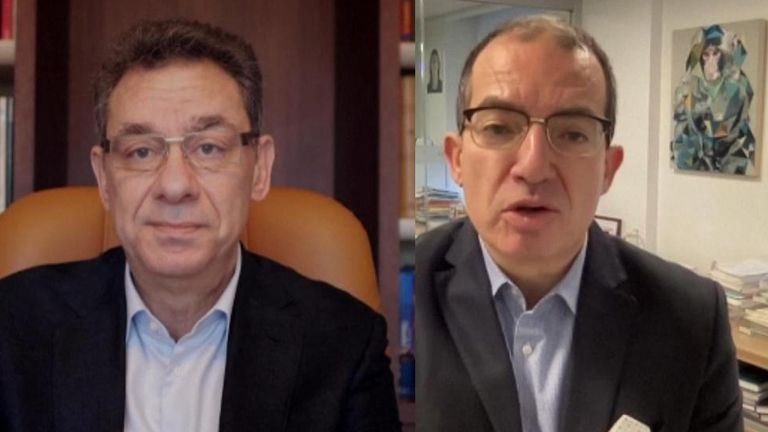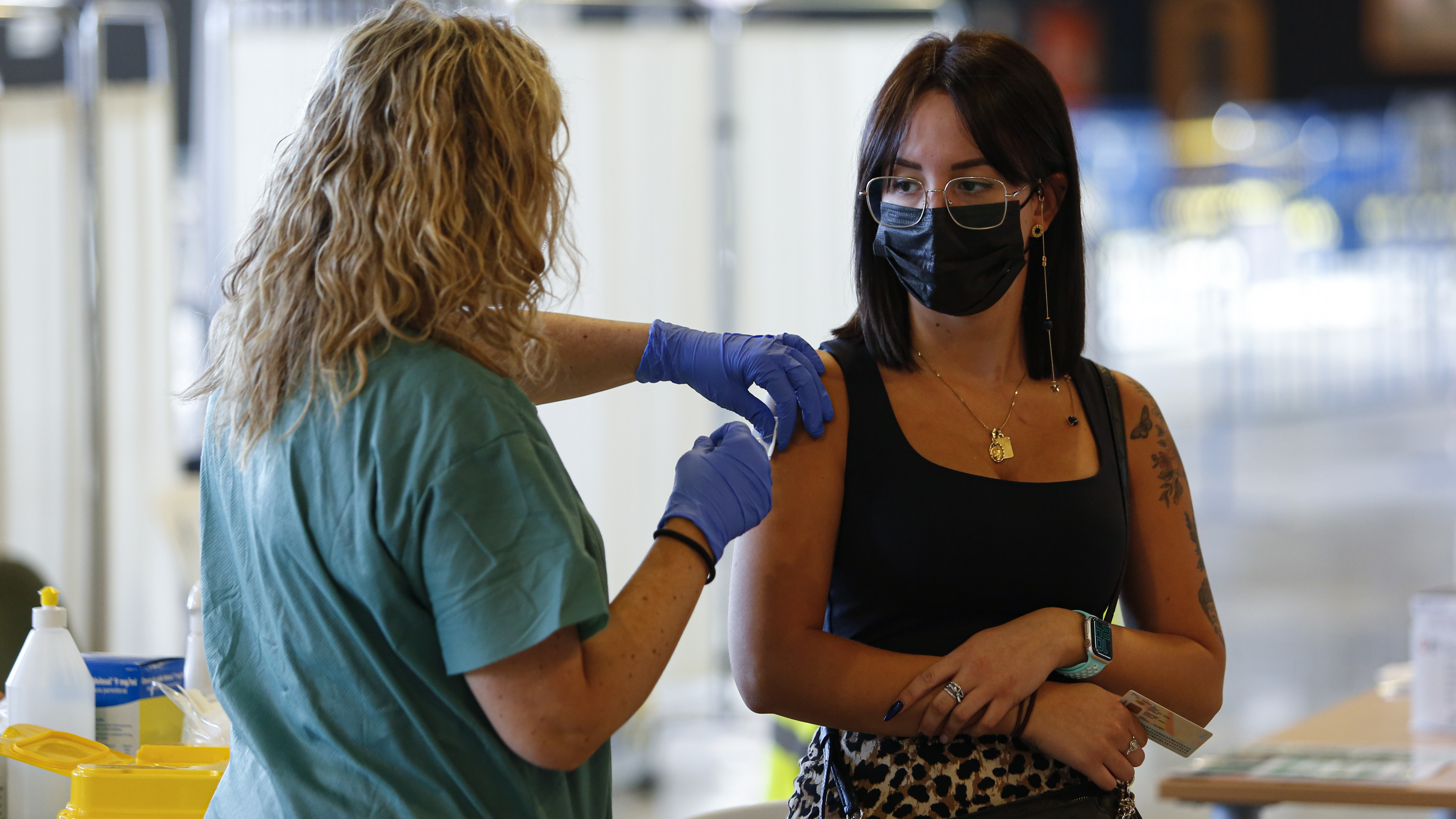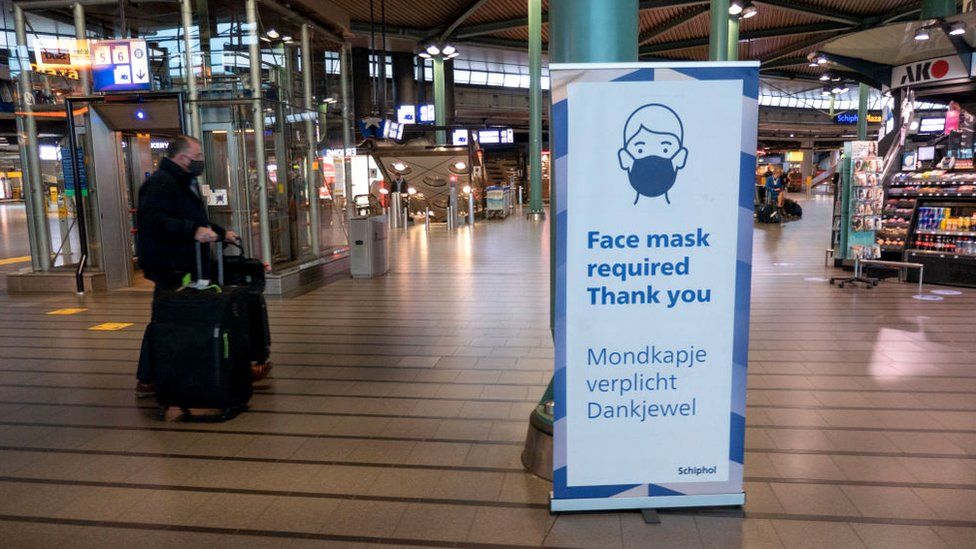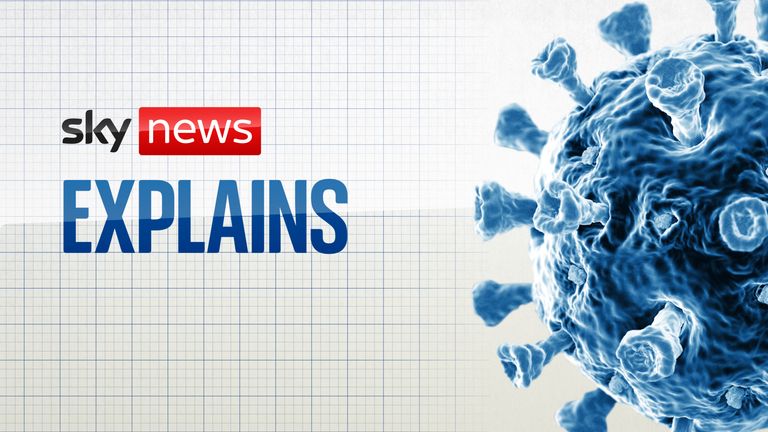The Pfizer vaccine is likely to offer strong protection against any severe disease from the new Omicron COVID variant, according to the head of BioNTech who urged people not to 'freak out'.
BioNTech developed one of the world's most widely-used jabs with Pfizer, and the company's chief executive and founder Ugur Sahin said: "To my mind there's no reason to be particularly worried.
"The only thing that worries me at the moment is the fact that there are people that have not been vaccinated at all."
The BioNTech boss's guarded confidence contrasts with more pessimistic comments by the chief executive of rival vaccine maker Moderna, Stephane Bancel, who raised the prospect of a material drop in protection against the new coronavirus strain from current vaccines.
Mr Bancel said he believes Omicron, first identified by researchers in southern Africa, is "highly infectious" and it is "highly possible" the effectiveness of vaccines is decreasing - adding that boosters may need a "double" dose to provide the best protection.
But Mr Sahin said: "We think it's likely that people will have substantial protection against severe disease caused by Omicron."
He specified severe disease as requiring hospital treatment or intensive care.
Mr Sahin added he expects laboratory tests over the next two weeks to show some loss of vaccine protection against mild and moderate disease due to Omicron, but the extent of that loss was hard to predict.
The high number of mutations on the protein spike the virus uses to infect human cells could mean existing vaccines need to be modified.
BioNTech is currently working on an upgraded version of its original vaccine, of which more than two billion doses have already been delivered, although he says it is still unclear whether that is needed.
And he said getting a third vaccine shot, or booster, will likely offer protection against Omicron infections of any severity compared to those who just have a two-dose course.
More than 20 cases of the Omicron variant have so far been identified across the UK, though experts expect this number to rise in the coming days.
Mr Sahin admitted antibodies brought about by vaccination could struggle to latch on to the new virus but he claimed T-cells, another line of immune defence, were set to recognise the vast parts of Omicron's spike protein that remain unchanged.
While antibodies bind to viruses directly and prevent infections, longer lasting T-cells attack cells that have already been hijacked by the virus, warding off viral replication and severe disease.
And in a separate interview, he told the Wall Street Journal: "Our message is: Don't freak out, the plan remains the same: Speed up the administration of a third booster shot.
"Our belief [that the vaccines work against Omicron] is rooted in science: If a virus achieves immune escape, it achieves it against antibodies, but there is the second level of immune response that protects from severe disease - the T-cells.
"Even as an escape variant, the virus will hardly be able to completely evade the T-cells."
Meanwhile, America's top infectious disease expert, Anthony Fauci, has said it is too early to know whether the Omicron variant will lead to severe disease - while offering another example of cautious optimism.
Dr Fauci said there were 226 confirmed cases of the variant in 20 countries as of Tuesday morning but that Omicron had not been detected yet in the United States.
"It is very difficult to know whether or not this particular variant is going to result in severe disease," Dr Fauci said.
"Although some preliminary information from South Africa suggests no unusual symptoms... we do not know, and it is too early to tell."
Albert Bourla, chief executive of Pfizer, said he was "very confident" the jab works against all known mutations of coronavirus, including Omicron.
However, he said his firm has already started making a new vaccine against the variant, adding: "Within 95 days basically we will have a new vaccine."
Follow the Daily podcast on Apple Podcasts, Google Podcasts, Spotify, Spreaker
Earlier, Mr Bancel said the new strain is overtaking Delta in South Africa at a faster rate than previously seen.
"It took around four months for Delta to take over Beta, and it seems it's taking just a couple weeks for this new variant to take over Delta," he told CNBC.
Both he and Mr Bourla stressed that more data is needed to fully understand whether B.1.1.529 is more contagious or resistant to vaccines.
Mr Bancel said: "Given the large number of mutations, it is highly possible that the efficacy of the vaccine, all of them, is going down. But we need to wait for the data to know if this is true, and how much is it going down."
https://news.google.com/__i/rss/rd/articles/CBMipAFodHRwczovL25ld3Muc2t5LmNvbS9zdG9yeS9jb3ZpZC0xOS1iaW9udGVjaC1ib3NzLXNheXMtZG9udC1mcmVhay1vdXQtYWJvdXQtb21pY3Jvbi1hcy1wZml6ZXItdmFjY2luZS1saWtlbHktdG8tcHJvdGVjdC1hZ2FpbnN0LXNldmVyZS1kaXNlYXNlLWZyb20tdmFyaWFudC0xMjQ4MzQ4MdIBqAFodHRwczovL25ld3Muc2t5LmNvbS9zdG9yeS9hbXAvY292aWQtMTktYmlvbnRlY2gtYm9zcy1zYXlzLWRvbnQtZnJlYWstb3V0LWFib3V0LW9taWNyb24tYXMtcGZpemVyLXZhY2NpbmUtbGlrZWx5LXRvLXByb3RlY3QtYWdhaW5zdC1zZXZlcmUtZGlzZWFzZS1mcm9tLXZhcmlhbnQtMTI0ODM0ODE?oc=5
2021-11-30 23:06:58Z
1191811192








